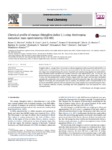Use este identificador para citar ou linkar para este item:
http://biblioteca.incaper.es.gov.br/digital/handle/item/1886Registro completo de metadados
| Campo DC | Valor | Idioma |
|---|---|---|
| dc.contributor.author | OLIVEIRA, B. G. | pt_BR |
| dc.contributor.author | COSTA, B. C. | pt_BR |
| dc.contributor.author | VENTURA, J. A. | pt_BR |
| dc.contributor.author | KONDRATYUK, T. P. | pt_BR |
| dc.contributor.author | BARROSO, M. E. S. | pt_BR |
| dc.contributor.author | CORREIA, R. M. | pt_BR |
| dc.contributor.author | PIMENTEL, E. F. | pt_BR |
| dc.contributor.author | PINTO, F. E. | pt_BR |
| dc.contributor.author | ENDRINGER, D. C | pt_BR |
| dc.contributor.author | ROMÃO, W. | pt_BR |
| dc.contributor.other | Bruno G. Oliveira, UFES; Helber B. Costa, UFES; Jose Aires Ventura, Incaper; Tamara P. Kondratyuk, University of Hawaii at Hilo; Maria E. S. Barroso, UVV; Radigya M. Correia, UFES; Elisângela F. Pimentel, UVV; Fernanda E. Pinto, UFES; Denise C. Endringer, UVV/IFES; Wanderson Romão, UVV/IFES. | pt_BR |
| dc.date.accessioned | 2016-05-06T12:38:59Z | - |
| dc.date.available | 2016-05-06T12:38:59Z | - |
| dc.date.created | 2016 | pt_BR |
| dc.date.issued | 2016-05-06 | pt_BR |
| dc.identifier.other | 11463 | pt_BR |
| dc.identifier.uri | http://biblioteca.incaper.es.gov.br/digital/handle/item/1886 | - |
| dc.description | Mangifera indica L., mango fruit, is consumed as a dietary supplement with purported health benefits; it is widely used in the food industry. Herein, the chemical profile of the Ubá mango at four distinct maturation stages was evaluated during the process of growth and maturity using negative-ion mode electrospray ionisation Fourier transform ion cyclotron resonance mass spectrometry (ESI(-)FT-ICR MS) and physicochemical characterisation analysis (total titratable acidity (TA), total soluble solids (TSS), TSS/TA ratio, and total polyphenolic content). Primary (organic acids and sugars) and secondary metabolites (polyphenolic compounds) were mostly identified in the third maturation stage, thus indicating the best stage for harvesting and consuming the fruit. In addition, the potential cancer chemoprevention of the secondary metabolites (phenolic extracts obtained from mango samples) was evaluated using the induction of quinone reductase activity, concluding that fruit polyphenols have the potential for cancer chemoprevention. | pt_BR |
| dc.language | pt_BR | pt_BR |
| dc.publisher | Food Chemistry, v. 204, p. 37-45, august 2016. | pt_BR |
| dc.subject | Chemical profile | pt_BR |
| dc.subject | Mangifera indica L. | pt_BR |
| dc.subject | Mango | pt_BR |
| dc.subject | Mass spectrometry | pt_BR |
| dc.title | Chemical profile of mango (Mangifera indica L.) using electrospray ionisation mass spectrometry (ESI-MS). | pt_BR |
| dc.type | -- | pt_BR |
| dc.ainfo.id | 10790 | pt_BR |
| dc.ainfo.lastupdate | 2016-05-06 | pt_BR |
| dc.ainfo.depositante | Merielem Frasson | pt_BR |
| Aparece nas coleções: | Memória Técnica do Incaper  | |
Arquivos associados a este item:
| Arquivo | Descrição | Tamanho | Formato | |
|---|---|---|---|---|
| BRT-Chemical-profile-of-mago-2016-Aires-Ventura.pdf | 1,14 MB | Adobe PDF |  Visualizar/Abrir |
Os itens no repositório estão protegidos por copyright, com todos os direitos reservados, salvo quando é indicado o contrário.
